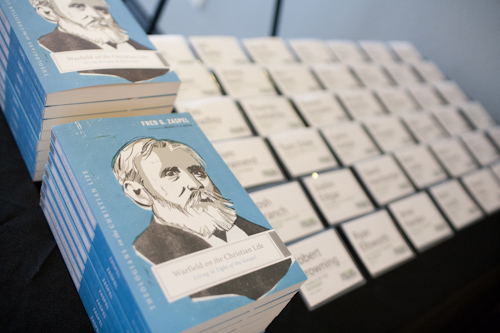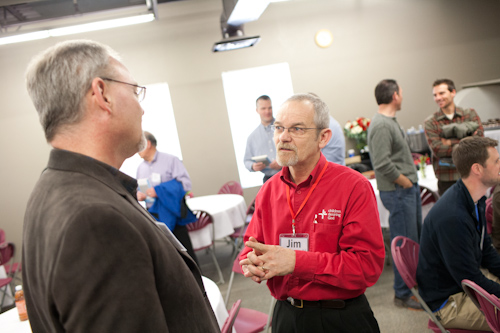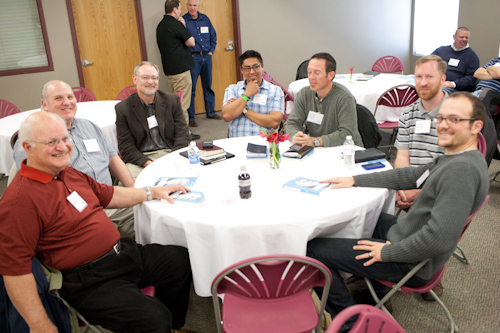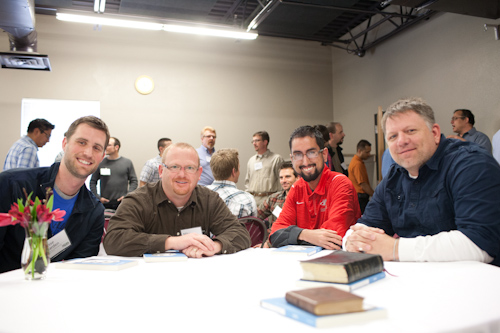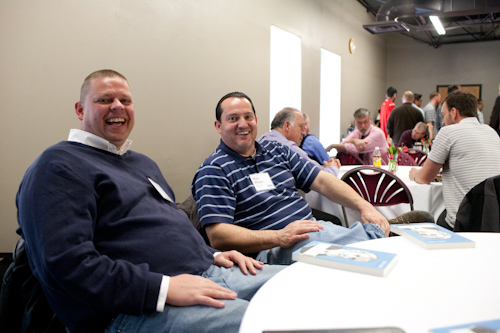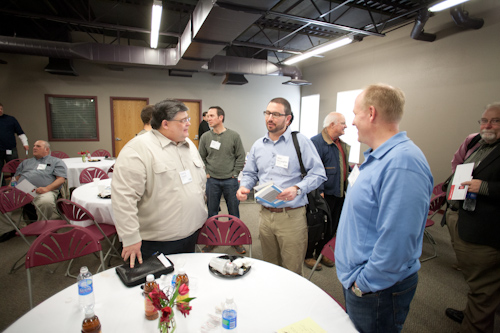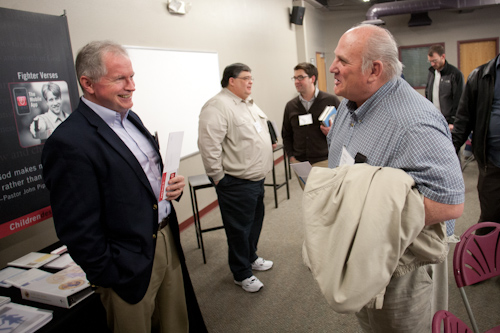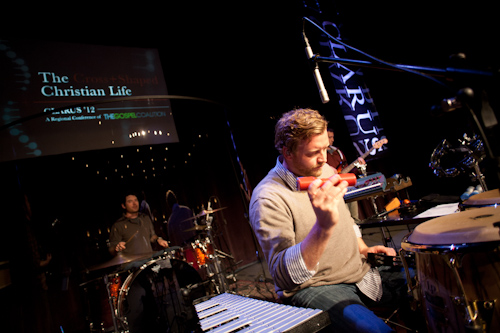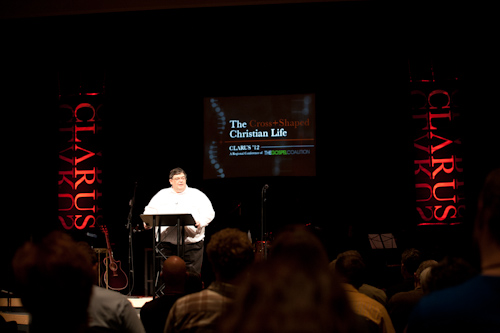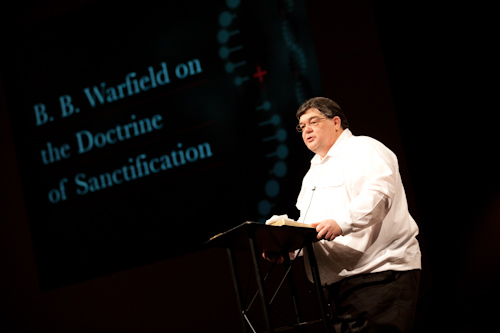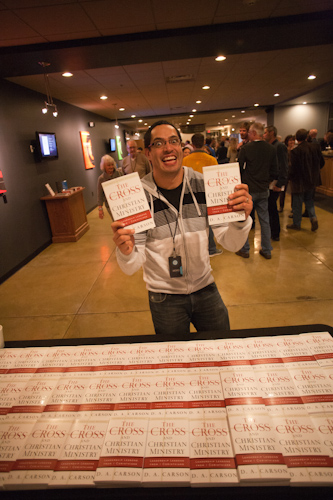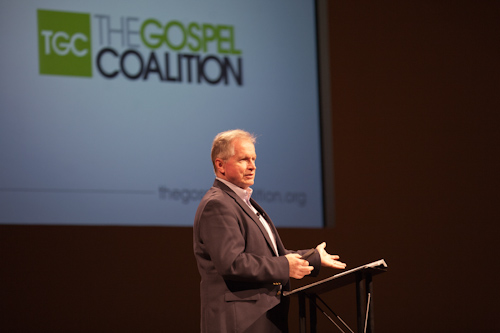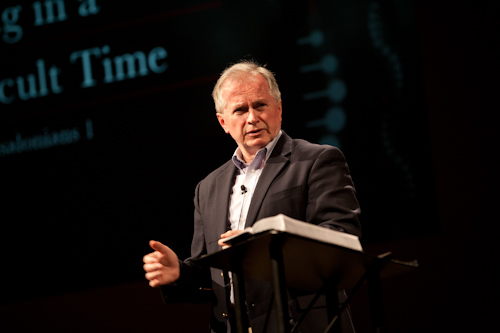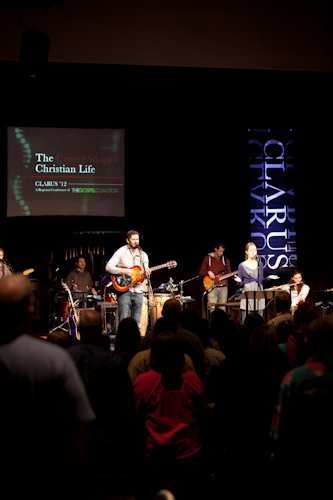Archive for the Clarus 12 Category
Mar 10
Session 3 Recap: Zaspel, “Serving as He Served” – John 13:1-17
Editor’s Note: Tim Ragsdale is Pastor for Local Missions at Desert Springs Church in Albuquerque, NM. This post is a summary of Fred G. Zaspel’s message from Saturday morning, March 10, “Serving as He Served,” from John 13:1-17.
••••
Dr. Fred Zaspel’s message “Serving as He Served†was on John 13:1-17. In chapter 13, the focus of John’s gospel has changed as Jesus’ hour approaches, and Jesus is addresses his disciples. Jesus’ departure was near and his focus and concern was upon his disciples who would remain after his departure.
Surrounded by disciples with a propensity to argue among themselves as to who is the greatest who jockey for privileged seats in glory, Jesus puts on a spectacular demonstration of his own glory – no, he doesn’t. Instead he takes on the servant role of the lowest of the low in the culture. He lays aside his outer garments (note: “lays aside†is not the typical language for simply changing clothes, but more closely parallels Christ’s humbling of himself in Philippians 2 where he lays aside his own glory taking on the form of a servant) and humbly washes his disciples’ feet.
Jesus is clearly demonstrating a lesson on servant leadership, but did they really understand all that his symbolic gestures represented? The disciples did not yet have the Cross to reflect upon, though later they would understand (v.7). As the disciples did not completely grasp all of the symbolism of Jesus’ actions, they do see humble servant leadership in action. When we see Jesus’ command for us to love one another as he has loved us, he has not left us without an example.  Though we shouldn’t read too much into it – Jesus even washed the feet of Judas Iscariot.
When we listen to our ugly pride and see ourselves above humble (and “lowlyâ€) service, do we see what that means? Though we’d never say it, our attitudes and actions reveal that we think we are better than our Master. Now that we know these things, may we be blessed as faithful doers. Let us pray for appropriate humility – after all, we have so much to be humble about.
Mar 10
Session 2 Recap: Carson, “Living in a Difficult Time” – 2 Thessalonians 1
Editor’s Note: This is a guest post by Tom Brainerd, Senior Pastor at Trinity Reformed Church in Edgewood, NM. Tom is a member of the Albuquerque Chapter of The Gospel Coalition. This post is a summary of D.A. Carson’s message from Friday night, March 9, “Living in a Difficult Time” from 2 Thessalonians 1.
••••
For the last 2-3 decades modern philosophers and preachers have developed ‘Defeater Beliefs;’ if these things are true, then other beliefs cannot be true. One of the common Defeaters in the west is that there cannot possibly be ‘one true religion,’ an inoculation against Christianity and Christ’s exclusivity. Once a question like “What about the good Hindus?†comes out, the discussion is over and they don’t have to listen anymore. Christianity is generally outside of the ‘implausibility structure’ of the current array of Defeater Beliefs, making it the religion of cranks and the naïve.
Of course, ours is not the first generation to face Defeaters. Indeed, the first century church was in much the same position. Carson indicates that it used to be in campus ministry the atheists were at least clear that the god they did not believe in was the ‘Christian God.’ It is no longer so clear. As we moan about the decline of Christendom, think about the pluralism faced by the Apostles. The New Testament authors are unflinching. The problem is the alienation of fallen man from the God Who Is There. Period. Man needs to be freed from Original Sin. Period. The eschatological vision of the wedding feast of the Lamb and the lake of fire will come to fruition. Period.
In the midst of this are the Thessalonians, under pressure within a culture that hates their Christ and from their immaturity as believers. Paul talks about their perseverance (vv. 3-4), though indirectly. Instead, of the Pauline ‘triad’ of faith, hope and love, he give thanks for faith that grows exceedingly and love that abounds toward each other, both in the teeth of opposition; from these he knows that they do, indeed, persevere. They are a community of faith standing against a world that does not believe and, ‘because you love each other more in hope and faith, THEREFORE we boast in you.’
Applied to our own circumstances…the essence of Christianity lies not in building, budget or size, or offerings…but in the multiplication of faith, hope, and love. We have churches that are doctrinally robust, but don’t love each other, that don’t really trust God, but trust in arguments and propositions. Living out truth, not merely holding it out, yields faith and love. Knowledge can puff us up and inoculate us against trust and confidence in God.
From that trust and confidence proceeds love among believers…and that infers perseverance. When Paul boasts about their virtues, he is boasting about the power of the Gospel and the Christ-like-ness it is bringing about in their lives. ‘Look at your faith…look at your love.’ All this is evidence.
All this…suffering and endurance testify that God’s judgment about these things is right. These things…that you will be at the wedding feast of the Lamb, and that those who persecute will be repaid by the Lord, everlasting destruction from His presence. Opposition was theirs…they were found worthy to suffer for the kingdom of God…along with Peter and the rest of the Apostles, who rejoiced that they had been found worthy to suffer for the name of Christ (Acts 5). Perhaps they remembered what Jesus had told them, that if they suffered for His sake they would be blessed.
Imagine what the church in North America would be like if every time we were picked on for Christ’s sake we said “It’s wonderful to bear reproach for Christ’s sake,†instead of saying “This whole culture is going to Hell.†The Thessalonians, and the Apostles, are Christians who are rejoicing that they are suffering for Christ’s sake. And now we have evidence of God’s right judgment in the suffering of Christians in China and Iran. The truth prevails and there will be opposition. And they are being told that they are counted worthy of the kingdom of God.
When will this happen? When will they enter their rest? In that eschatological day when Jesus is revealed. They look to their certain hope. When we use the word “hope†in English, there is an inherent element of doubt. Christian hope knows no doubt. The certainness of Christian hope is the promises of God. That is the hope that faith and love are built upon, certainness of blessing…and cursing. Justice will be done, a hated thought in a world that loves pluralism.
In that end, the caricatures will fall away. Heaven will be a place of blessed and productive work, with Lord and Lamb at the center. Hell will be a place of weeping and gnashing of teeth, a place, markedly, of no repentance. Sin will be its own penalty.
When Christ returns, He will come glory in His people and they will marvel at Him. He does not us to marvel at Him…we need to marvel at Him. The sign of our redemption is that the one we hated, the one whose enemy we were, became the one we love, and that we marvel at.
And what does Paul end praying for? That our God might make us worthy of His calling, that the name of our Lord Jesus may be glorified in us. For us, in our prayer lives and our church lives, how often do we offer prayers like that? Yet at the center of the Apostollic prayer is this…sanctification. To live a life worthy of being a Christian, that by His power every desire for goodness and every deed might be prompted by faith, in love, founded on hope.
It is a prayer that embraces absolutely everything.
Mar 10
Session 1 Recap: Zaspel, “B.B. Warfield on The Doctrine of Sanctification”
Editor’s Note: This is a guest post by Tom Brainerd, Senior Pastor at Trinity Reformed Church in Edgewood, NM. Tom is a member of the Albuquerque Chapter of The Gospel Coalition. This post is a summary of Fred G. Zaspel’s message from Friday night, March 9, “B.B. Warfield on The Doctrine of Sanctification.” Click here for an outline of Dr. Zaspel’s talk.
••••
As I talked to my congregation about Clarus I had to tell them “I’ve never actually heard of Fred Zaspel.†Of course, in the rarified Reformed air, it is not unusual to only know of those of your own tradition. In this case, I am delighted to have become acquainted with this fine pastor and scholar and am honored to rehearse and reflect on this excellent talk. Zaspel exhibits understanding of Warfield (he wrote the book) and in less than an hour presented what took a seminary term.
To the towering intellect and heart for Christ of Benjamin Breckinridge Warfield (the “Lion of Princetonâ€), Christianity must be both propositional and experiential. To have either a well-informed mind or a warmed heart was a false dichotomy; true religion combined the two, each depending upon the Triune God. The Christian himself is supernatural, a walking miracle, redeemed through the power of Christ’s sacrifice, then transformed into the image of Christ, both supernaturally.
The transformation, the outworking of godliness in lives is the essence of salvation. Justification (that initial sanctification) and what we think of sanctification (conforming to Christ) are distinct but inseparable. The penalty of sin our sinfulness itself; our sanctification over time is a relief from that penalty.
Warfield sees the beginning, middle and end of the Christian life. It begins with justification, where sin’s grip on us is broken. It continues in “progressive” sanctification, the work of grace by which believers are freed from the effects of sin and built up in holiness. And glorification is that “final sanctification,” freedom from the presence of sin.
The breaking of the power of sin in justification is linked directly to Paul’s great question in Romans 6:1:
Shall we continue in sin that grace may abound?
With Paul, Warfield sounds a hearty “may it never be!†United with Christ in death and resurrection the believer is freed, and sin no longer has dominion. Sanctification (initial, progressive, and final) is the breaking of the power of sin. We were sinners, and we lived like it. It is impossible to die with Christ, yet live in that way. We are now led by the Spirit on pathways of righteousness (Romans 8:14). Union with Christ changes everything. We are a people who have been freed from bondage to sin.
This is where Warfield falls out with the “higher life” movements of the 19th century. Their assertion of a “higher level of trust” conflicts with the promises of Romans 8:14. As opposed to believers “moving to the next level,” all are led by the Spirit. Freedom from sin that Christ purchased gives the lie to the higher life teaching of “two natures” within the believer. And the “quietism” of the higher life folks (“let go and let God”) does not agree with Philippians 2:12; “working out salvation” mandates cooperation with the Holy Spirit in His gracious work of “forming Christ.” God is at work and we are to work accordingly. Warfield emphasizes the New Testament stress on Christian striving toward holiness.
For that striving, Warfield holds out the Word of God as one of the primary means of grace. The Scriptures make us wise unto the whole of salvation, from beginning to end and everywhere in between…including the practical godliness that is inseparable from salvation. Ever-deepening understanding of the Scriptures brings ever-deepening worship and godliness. Christian obedience is rooted in understanding and appreciating the self-sacrificing love that Christ has for us…embedded in the Scriptures.
Of all things, Warfield is supremely confident of the end, assured that we will attain the goal. But attaining will not be of us. Instead, we have been shown the trophy. Our names are already engraved upon it. The Judge has held it out before us and said “You’re going to win this.†This is the kind of race Warfield holds out.
Dr. Zaspel’s new book, Warfield on the Christian Life: Living in Light of the Gospel is available from Crossway Books.
Mar 10
Photos from Friday at Clarus ’12
Though Clarus begins on Friday evening, we have a long standing tradition of gathering with area pastors to interact with our conference speakers. Today, 40 Albuquerque area ministers gathered for a lunch sponsored by Children Desiring God and an hour of Q&A with our speakers, D.A. Carson and Fred G. Zaspel. Here are some photos from that event followed by photos from Friday night.
Pastors Luncheon and Q&A
Friday Night
Mar 9
Clarus ’12 is Now!
Today begins our three day conference on “The Cross-Shaped Christian Life.” Across seven sessions, we will explore the myriad of ways in which the glorious work of Jesus Christ gives shape to our lives as those who are saved by and transformed by the cross.
Here are some Scriptures to read as a primer for the weekend ahead:
But far be it from me to boast except in the cross of our Lord Jesus Christ, by which1Â the world has been crucified to me, and I to the world.
–Galatians 6:14For I delivered to you as of first importance what I also received: that Christ died for our sins in accordance with the Scriptures, that he was buried, that he was raised on the third day in accordance with the Scriptures. . .
–1 Corinthians 15:3-4And he said to all, “If anyone would come after me, let him deny himself and take up his cross daily and follow me. For whoever would save his life will lose it, but whoever loses his life for my sake will save it.
–Luke 9:23-24He who did not spare his own Son but gave him up for us all, how will he not also with him graciously give us all things?
–Romans 8:32Therefore, since we are surrounded by so great a cloud of witnesses, let us also lay aside every weight, and sin which clings so closely, and let us run with endurance the race that is set before us, looking to Jesus, the founder and perfecter of our faith, who for the joy that was set before him endured the cross, despising the shame, and is seated at the right hand of the throne of God. Consider him who endured from sinners such hostility against himself, so that you may not grow weary or fainthearted.
–Hebrews 12:1-3For the word of the cross is folly to those who are perishing, but to us who are being saved it is the power of God.
–1 Corinthians 1:8But whatever gain I had, I counted as loss for the sake of Christ. Indeed, I count everything as loss because of the surpassing worth of knowing Christ Jesus my Lord. For his sake I have suffered the loss of all things and count them as rubbish, in order that I may gain Christ and be found in him, not having a righteousness of my own that comes from the law, but that which comes through faith in Christ, the righteousness from God that depends on faith—that I may know him and the power of his resurrection, and may share his sufferings, becoming like him in his death, that by any means possible I may attain the resurrection from the dead.
–Philippians 3:7-11
The Books and Resources Room opens at 4:30 PM and the first session begins at 6:00 PM. Registration is available online and at the door.







